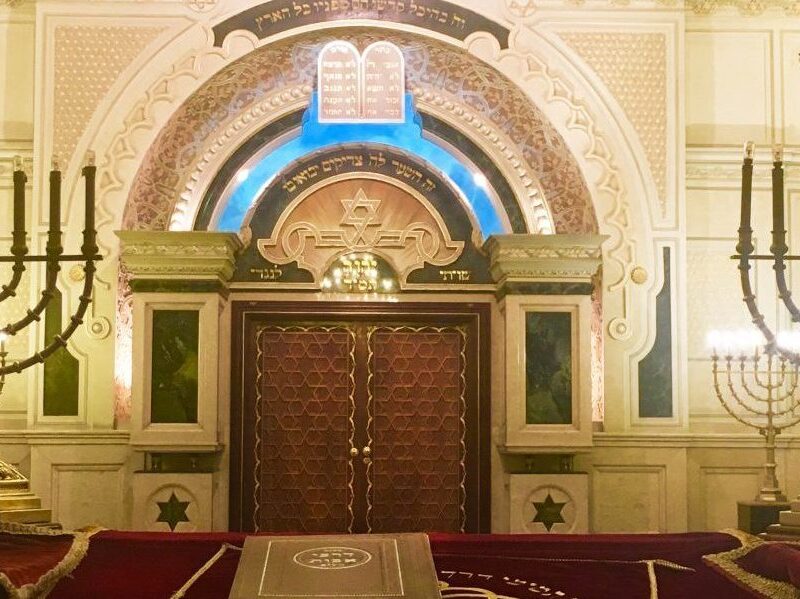Morocco is a land of layered histories and cultural crossroads — a place where Berber, Arab, Andalusian, and Jewish legacies intermingle. Among these, the Jewish presence in Morocco stands out as one of the oldest and most enduring in the Jewish diaspora. Let’s explore the journey of the Jews in Morocco: from their ancient roots to their dwindling presence of today.The Kara Prison, or Habs Qara in Arabic, is a haunting testament to the enigmatic reign of Sultan Ismail bin Sharif during the early 18th century. What makes this underground prison so remarkable is not its imposing doors or fortified bars, but the profound mystery that shrouds its subterranean depths. A place of confinement like no other, the Kara Prison’s very structure is a riddle, leaving us to ponder the tales it holds.
The First Jewish Settlers in Morocco
Ancient Beginnings: Jewish presence in Morocco dates back more than 2,000 years, long before the advent of Islam. Some accounts suggest that Jews arrived as early as 586 BC, after the Babylonian destruction of the First Temple in Jerusalem. They settled across North Africa, including Morocco, establishing early Jewish communities.
Roman and Berber Periods: During Roman rule and later under Berber tribes, Jews integrated into local life. Some Berber tribes even converted to Judaism. Jewish life was deeply intertwined with the local cultures and customs, creating a unique Jewish-Berber identity.
Al-Andalus and the Sephardic Influence: A major wave of Jewish migration came with the expulsion of Jews from Spain in 1492, during the Spanish Inquisition. These Sephardic Jews brought with them rich traditions, languages (like Judeo-Spanish or Ladino), and scholarship. Morocco became a refuge for thousands fleeing persecution, enriching the Jewish communities that were already established.


A Vibrant Community Through the Centuries
Flourishing Under Tolerance: Although Jews in Morocco were considered dhimmis (non-Muslims under protection) under Islamic law and often lived in designated quarters called mellahs, Morocco was relatively tolerant compared to other parts of the world. Jews flourished as traders, scholars, artisans, and advisors to sultans.
Golden Periods: Jewish culture thrived in cities like Fez, Meknes, Essaouira, Marrakesh, and Casablanca, where synagogues, schools, and Jewish neighborhoods prospered.
Religious Practice: Despite occasional persecution, Jewish communities continued to practice their faith openly, maintain kosher diets, build synagogues, and celebrate traditional holidays. Morocco’s Jewish population became one of the largest and most vibrant in the Muslim world.
Modern Times: Decline and Dispersion
Colonial Era and European Influence: During the French and Spanish protectorates (1912–1956), Moroccan Jews gained new opportunities in education and employment. Many attended French schools and began to assimilate into Western culture.
Mass Exodus (1948–1970s): Following the creation of the State of Israel in 1948, a combination of Zionist movements, anti-Jewish riots, and uncertainty about Jewish safety led to the emigration of over 250,000 Moroccan Jews to Israel, France, Canada, and the U.S. From a once-flourishing population of over 275,000, the Jewish community drastically dwindled.
Jews in Morocco Today
Population Today: As of 2025, fewer than 2,000 Jews remain in Morocco, most of them elderly, and primarily residing in Casablanca — the last major hub of Jewish life in the country. A handful remain in Marrakesh, Rabat, and Fez.
Practicing Their Faith: The remaining Jews in Morocco still continue to practice their faith. There are functioning synagogues, kosher butchers, and Jewish schools — mostly in Casablanca. The Moroccan government has also made efforts to preserve Jewish heritage, restoring cemeteries, synagogues, and former mellahs as part of its broader policy of celebrating Morocco’s multicultural identity.
Cultural Revival and Pilgrimage: In recent years, Morocco has welcomed Jewish pilgrims and tourists, especially during hiloulas (pilgrimages to the tombs of Jewish saints). Many Moroccan Jews in the diaspora maintain a deep affection for their ancestral land and return to visit.



